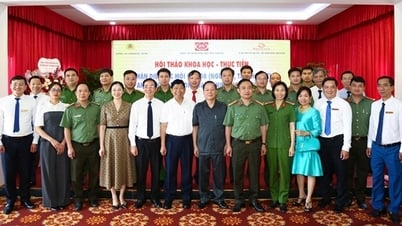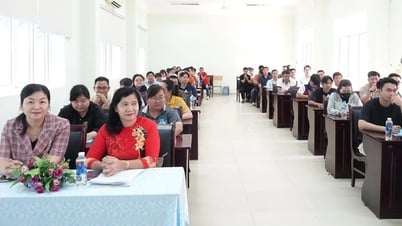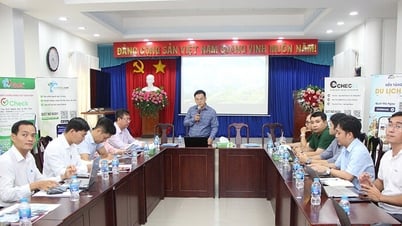
Promoting digital transformation in law-making. Illustrative photo
Towards a "digital" and transparent legal environment
In reality, the process of drafting legal documents still has many bottlenecks such as manual work, lack of connectivity between agencies, fragmented data and difficulty in accessing for the people. Meanwhile, digital transformation allows for standardization and automation of the legislative process from policy proposal, drafting, consultation to appraisal, examination and promulgation.
Currently, a number of ministries, sectors and localities have piloted the application of a legal document management system on an electronic platform, an online consultation system, integrated with the Public Service Portal and the national database. These are important steps towards a "digitalized" legal environment, transparent and with broad participation of people and businesses.
One of the outstanding potentials of digital transformation in law-making is the ability to apply artificial intelligence (AI) and big data to support policy impact assessment, legal analysis, risk forecasting and legislative trends. With the support of digital tools, data analysis from practice, from areas such as population, land, businesses, etc. will help agencies have a more multi-dimensional and scientific view before issuing policies.
Along with that, the connection and interconnection of data between legislative - executive - judicial agencies is also a prerequisite to ensure unity and synchronization in the legal system.
In the context of increasingly developing science and technology, the Ministry of Justice has researched the application of artificial intelligence in a number of activities. Notably, the work of reviewing legal documents and building, managing and exploiting the National Database of Laws.
This can contribute to improving the efficiency and quality of the process of perfecting the legal system as well as ensuring the publicity and transparency of the legal system, providing accurate and timely documents to serve the needs of state management, dissemination of law, research, study, application and enforcement of law by agencies, organizations and individuals.
Modernizing technical infrastructure, promoting digital transformation
Resolution No. 66-NQ/TW on innovation in law making and enforcement to meet the requirements of national development in the new era clearly states the guiding viewpoint that the State ensures and prioritizes resources to invest in facilities, modernize technical infrastructure, and promote digital transformation.
To implement the above direction, Resolution 66-NQ/TW requested to strengthen digital transformation, apply artificial intelligence, big data in the work of building and enforcing laws. Accordingly, prioritize resources to build and develop information technology infrastructure, big data, apply digital technology , artificial intelligence to serve innovation, modernize the work of building and organizing law enforcement, ensuring "correct, sufficient, clean, alive", interconnected, easy to exploit, easy to use, information security and state secrets.
At the same time, promptly arrange sufficient funding to build and immediately deploy the Project to build a large legal database and the Project to apply artificial intelligence in the work of building, checking and reviewing legal documents.
Apply digital technology and synchronize digital transformation in disseminating and educating the law, providing legal aid, and registering security measures; integrate the content of disseminating and educating the law into the "digital learning" movement. Have policies to promote the development of digital technology enterprises, providing digital services and utilities in the legal field.
Apply special mechanisms and policies to create breakthroughs in science, technology, innovation and national digital transformation for digital transformation activities, application of artificial intelligence and big data in law making and enforcement...
As a state management agency for reviewing legal documents, building and managing the National Legal Database, the Ministry of Justice has been promoting research and searching for information technology and artificial intelligence solutions to support these tasks in a unified and effective manner nationwide, and Resolution 66-NQ/TW will be a solid legal basis for the early implementation of the application of artificial intelligence in the work of building, checking and reviewing legal documents.
Dieu Anh
Source: https://baochinhphu.vn/tang-cuong-chuyen-doi-so-trong-xay-dung-phap-luat-102250522105808677.htm





![[Photo] Prime Minister Pham Minh Chinh attends the groundbreaking ceremony of Trump International Hung Yen Project](https://vphoto.vietnam.vn/thumb/1200x675/vietnam/resource/IMAGE/2025/5/21/ca84b87a74da4cddb2992a86966284cf)

![[Photo] Prime Minister Pham Minh Chinh chairs the Government's special meeting on law-making in May](https://vphoto.vietnam.vn/thumb/1200x675/vietnam/resource/IMAGE/2025/5/22/1c880aae96fd4e0894abc47a46fe19ba)





















































































Comment (0)